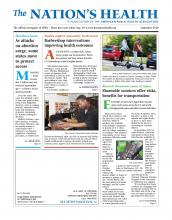Hydraulic fracturing
Physicians, Scientists and Engineers for Healthy Energy in June published the sixth edition of the “Compendium of Scientific, Medical and Media Findings Demonstrating Risks and Harms of Fracking,” by the Concerned Health Professionals of New York and Physicians for Social Responsibility. The compendium is a compilation of articles and reports on the safety risks and public health harms of hydraulic fracturing. For more information visit www.concernedhealthny.org/compendium/.
Palliative care
The National Academy for State Health Policy in May published “Palliative Care: A Primer for State Policymakers,” by Lyndsay Sanborn, MPHA, and Kitty Purington, JD. With funding from the John A. Hartford Foundation, the primer details how policymakers can implement and expand palliative care. For more information, visit www.nashp.org/palliative-care/
Communicable diseases
APHA Press has published “Control of Communicable Diseases: Laboratory Practice,” edited by Burton W. Wilcke, Jr., PhD. The resource builds on a laboratory’s role in responding to communicable disease threats. The book is a companion to the 20th edition of APHA’s renowned “Control of Communicable Diseases Manual.” For more information or to purchase the book, visit www.aphabookstore.org.
Existential threats
Hachette Books in August published “End Times: A Brief Guide to the End of the World,” by Bryan Walsh, a former Time Magazine reporter. The book explores existential threats to the human species, such as pandemics, climate change, artificial intelligence and nuclear war. For more information, visit www.hachettebooks.com/titles/bryan-walsh/end-times/9780316449601/.
Food science
In June, Penguin Random House published “The Fate of Food: What We’ll Eat in a Bigger, Hotter, Smarter World,” by Amanda Little, a professor of journalism and writer-in-residence at Vanderbilt University. The book details stories of innovation and sustainability to secure a global food supply threatened by climate change. For more information, visit https://www.amandalittle.com/fateoffood
Climate change
Penguin Random House in July published “No Good Alternative: Volume 2 of Carbon Ideologies,” by William Vollman. Vollman writes about ideologies surrounding coal pollution and carbon fracking, speaking to miners, CEOs and activists. For more information, visit www.penguinrandomhouse.com/books/566482.
Pollution
Penguin Random House in July published “How to Give Up Plastic: A Guide to Changing the World, One Plastic Bottle At a Time,” by Will McCallum, head of oceans at Greenpeace UK. The book is a guide to eliminating disposable plastics. For more information, visit www.penguinrandomhouse.com/books/607258/
Violence
Hatherleigh Press in August published “Teen Violence in America: How Do We Save Our Children,” by Joseph Kolb. The book examines the epidemic of youth violence and advocates for strategic change. Kolb is an award-winning national security and criminal justice journalist. For more information, visit www.penguinrandomhouse.com/books/606983.
Urban environmental health
MIT Press in September is scheduled to publish “Bridging Silos: Collaborating for Environmental Health and Justice in Urban Communities,” by Katrina Smith Korfmacher, PhD, MS. The book aims to draw communities together to combat environmental health disparities and work toward social justice. Kormacher is an associate professor in the Department of Environmental Medicine and Department of Public Health Sciences at the University of Rochester Medical Center. For more information, visit www.mitpress.mit.edu/books/bridging-silos.
Medical history
Penguin Random House in May published “A Short History of Medicine,” by Steve Parker. The book illustrates medicine and science through historical accounts and images, from ancient herbs to gene therapies. Parker is a senior scientific fellow at the Zoological Society of London. For more information, visit http://bit.ly/2LOkQCI.
- Copyright The Nation’s Health, American Public Health Association









